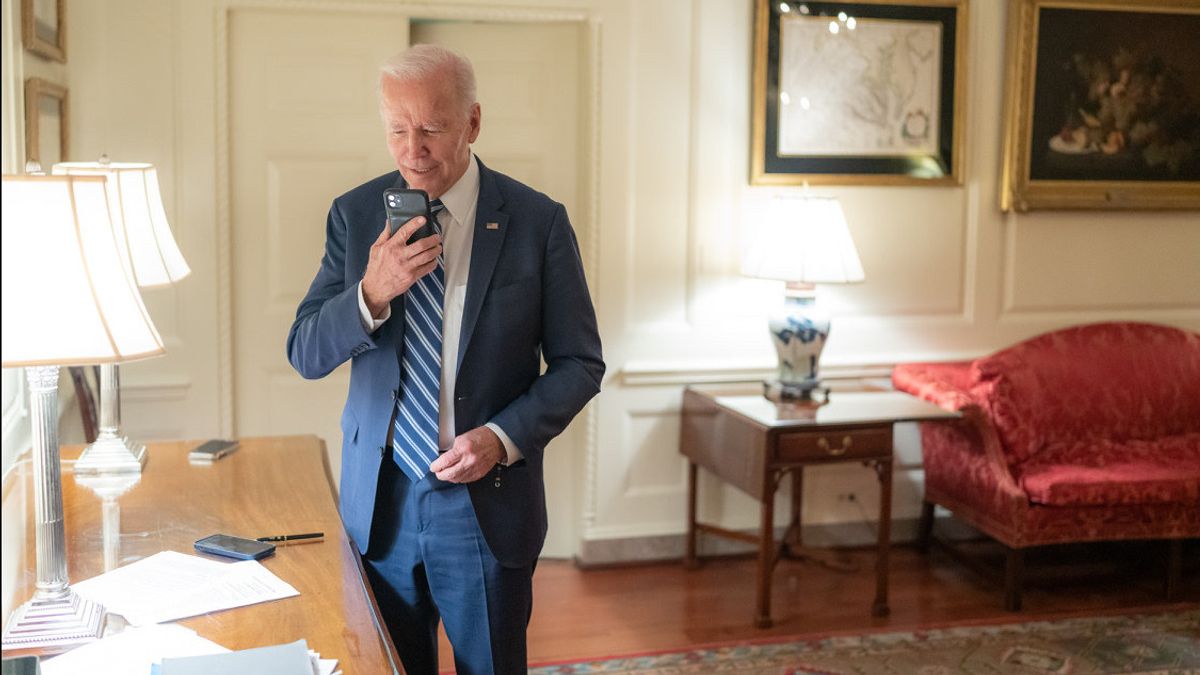JAKARTA - TikTok's most popular short video app, now offers to operate more of its business remotely and subject to outside surveillance. This proposal comes as they try to convince the US government to allow it to remain under the ownership of Chinese technology company ByteDance.
TikTok has been trying to reassure US government departments and agencies over the past three years that US citizens' personal data is inaccessible and its content cannot be manipulated by the Chinese Communist Party or any other entity, under the influence of the country's government.
Last year, US President Joe Biden revoked executive orders from his predecessor Donald Trump to ban TikTok in the United States. But negotiations between his administration and social media companies continue over potential deals that will address security concerns.
US lawmakers seeking to crack down on China as part of a broader range of disputes over trade war, intellectual property, and human rights have taken advantage of security concerns over TikTok to pressure the White House to take tough action.
TikTok has launched several measures aimed at calming the US government, including agreements with Oracle Corp to store application user data in the United States and the United States Data Security Division (USDS), to oversee data protection and content moderation decisions. The policy has spent $1.5 billion on recruitment and reorganization costs to build the unit.
But according to a Reuters report, several US government officials, including in the US Department of Defense, the Federal Bureau of Investigation (FBI) and the Central Intelligence Agency (CIA), remain against the security deal. The official argues that TikTok users will continue to be vulnerable as the app will still rely on its technology on ByteDance, which also operates China's short video app, Douyin.
To overcome these obstacles, TikTok seeks to provide the US government with a new layer of scrutiny. They have expanded Oracle's role to ensure that TikTok's technology infrastructure is separate from ByteDance.
According to a Reuters source, Oracle will review the application code, which determines the look and feel of TikTok, and the server code, which provides functions such as search and recommendations. A review will be conducted at a special "transparency center" visited by oracle engineers, for the first scheduled opening in Maryland in January.
TikTok also proposes to form a "protection" board that will run the USDS division independently of ByteDance," the source said.
The division is led temporarily by Andrew Bonillo, a former US Secret Service agent, and until a security deal with the US is reached, the division reports to TikTok's Chief Executive, Shou Zi▁hukum.
The USDS board will have three members to screen by the Foreign Investment Committee in the United States (CFIUS), a national security panel, the source said. ByteDance will have no control over the council and its decision, although they will continue to pay for the USDS division's operations.
TikTok is also seeking to hire independent auditors and monitors to be paid by the company but they report to CFIUS. They have submitted proposal requests for several roles to companies and consultants and have set deadlines for responses in the first half of January.
The source requested anonymity to discuss the expansion of Oracle's role, proposed representative council, and details of recruitment and spending on TikTok, which were reported for the first time.
A TikTok spokesman declined to comment on the special concessions the company had created to the US government. But said that the solution to the security concerns raised to CFIUS was "comprehensive". He added that TikTok had not discussed with the US government "about the substance of the proposed agreement" since late summer.
"We have made substantial progress in implementing that solution over the past year, and look forward to resolving that work to resolve this issue," a TikTok spokesperson said.
Oracle did not respond to a request for comment. A Ministry of Finance spokesman, who leads CFIUS, also declined to comment in addition to saying the panel was committed to maintaining national security. The White House declined to comment on CFIUS' reviews on TikTok.
White House Decree
According to one of the sources, US officials involved in the talks have indicated that many of the voluntary measures implemented by TikTok to increase its security could be part of any agreement to allow ByteDance to maintain its holdings. However, it is unclear whether the Biden administration will eventually sign a security deal with TikTok.
This is one of the legal challenges of the company that hinders Trump's efforts to impose divestment.
The results will ultimately be determined by the White House, as Biden will be asked to hear arguments from various departments and government agencies supporting or rejecting the deal.
The English, Chinese, Japanese, Arabic, and French versions are automatically generated by the AI. So there may still be inaccuracies in translating, please always see Indonesian as our main language. (system supported by DigitalSiber.id)









